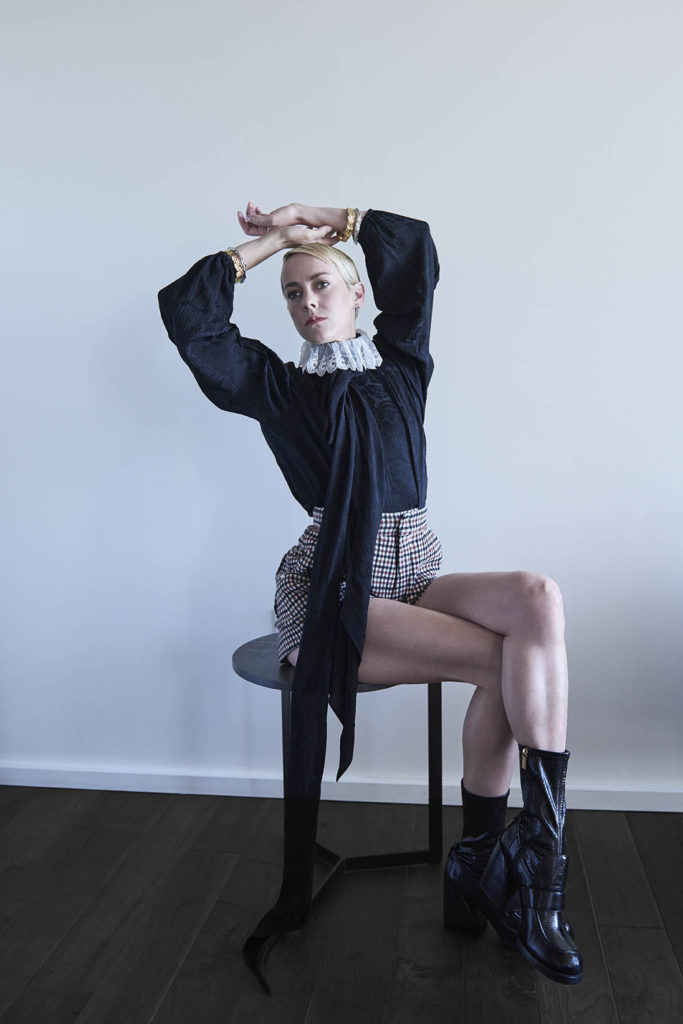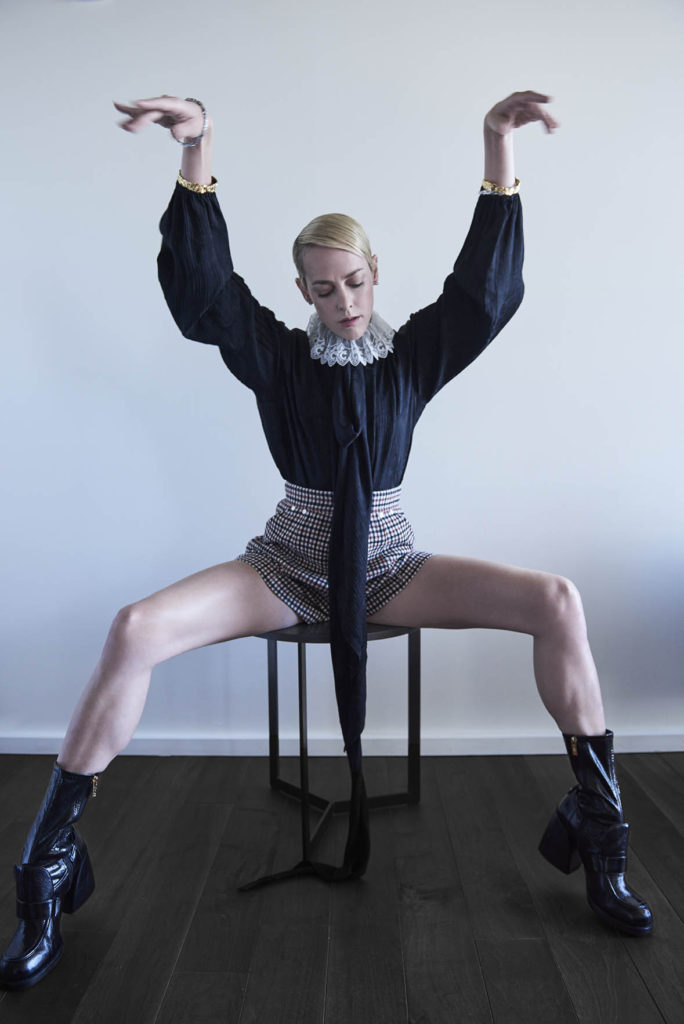JENA MALONE
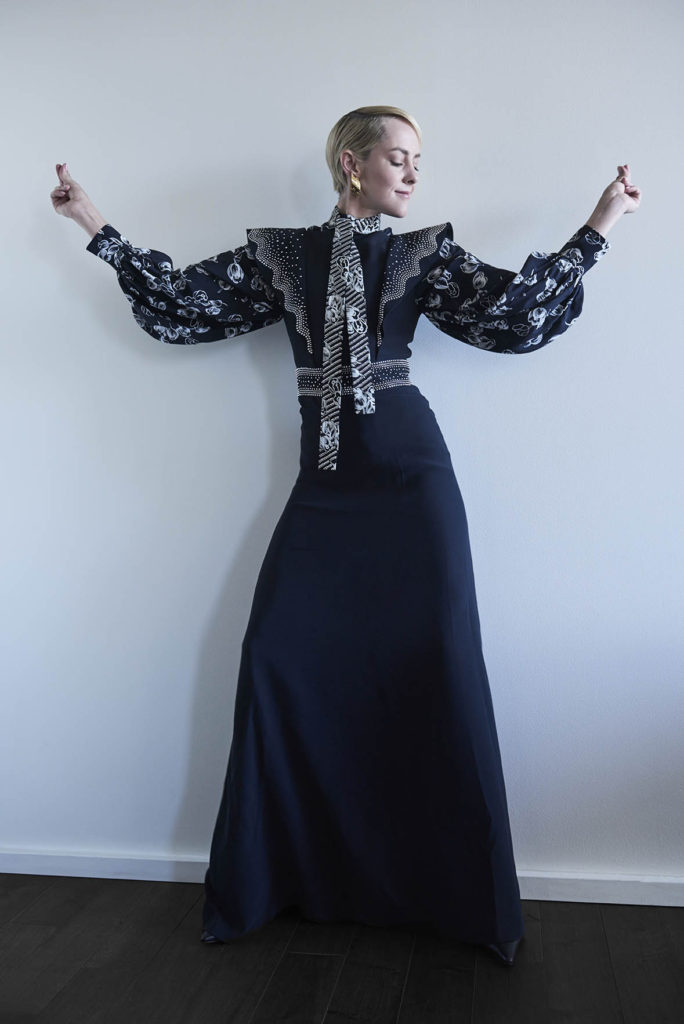
Dress, boots and earrings by LOUIS VUITTON
Interview by Sydney Nash
You’ve been very open about your childhood, growing up poor and moving constantly. In past interviews, you’ve characterized your transient upbringing as a positive thing for you. What kind of perspective did this lifestyle give you at a young age and how would you define “home?”
I was raised sort of lower middle class and a bit transient, living out of cars and hotels and moving around a lot. It’s not necessarily a traditional upbringing but one that I think mirrors a lot of human beings’ experiences in this society. It’s important to talk about honestly where you’ve come from and your experiences. From talking about it so much, what has been the most interesting thing that’s unearthed, or rather distilled, is that it’s really been a gift to me to have had so many different types of experience as a human, as a woman. Moving around a lot and not being raised with a lot of money or ability or a sort of a built-in skill set allowed me to create a space where I could find home anywhere. It crumbled that theory of home as just a built house or concrete structure. Actually, home is something that you find within. It’s a gift to an actor. My work is constantly moving. It’s a transient work, so it’s allowed me to embrace that with a form of confidence and ease. But it’s also allowed a bigger picture of change, to not hold a threat, but rather allowing change into your life as something that is going to strengthen you. I think that was the gift that my mommas gave me by raising me the way that they did.
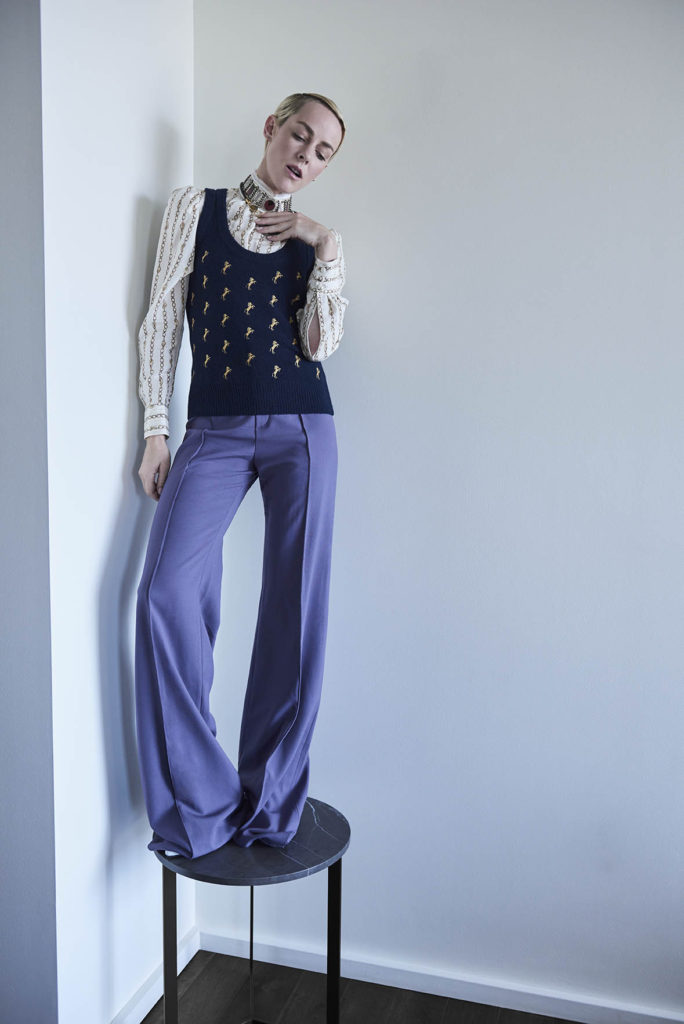
I read that you grew up backstage watching your mother perform. Is this what initially drew you to acting? Tell me what those moments were like for you.
I was raised watching my mom perform in music, theater, community theater and dinner theater, pretty much anything she could get her hands on in the Reno, Tahoe environment. Heralded memories from when you were a child take on an extra layer of gauze because you recall them so much. Sometimes I wonder if it was just a moment I’ve painted with a heralding tongue, but I do remember really being awestruck by seeing this mother of mine and how she was working three jobs. She was a beautiful woman, but to the transformation she would take when she would get on stage with the makeup, hair and the wardrobe and she would step into this new body. There was this embodiment of power and courage that felt really potent to me as a child. There’s just something really beautiful about seeing your parents transform in front of you, and I definitely got hooked on some sort of romanticism of transformation as a young woman. I’m not sure if that directly translated into wanting to be an actor when I was four or five. We all just want to do what our parents do, but it definitely planted beautiful seeds of want and desire for transformation.
Your acting debut came in 1996 with Bastard Out of California when you were just 11. You received an Independent Spirt Award and SAG nomination for this role and the next year you were nominated for a Golden Globe for your role in the movie Hope. What was it like to receive critical success at such a young age? Did it cause any internal or external pressure moving forward in your career?
Things that are really critically acclaimed and well-received as a young child actor and your work being heralded, there’s always a cliff-edge to that. Every height has an edge. I don’t think at the time, I really thought of it as something that was disastrous, or I don’t think I was thinking of it as a limitation. It only seemed like, Oh cool, they think I know what I’m doing, so maybe I think I know what I’m doing kind of moment. It’s interesting to have your work heralded, and it’s also interesting to have your work not heralded. It was nice to have a space when I was younger to have that kind of exposure and appreciation.
It made me see, Oh that’s what that is. There’s also working on something that no one sees that you may think is your best work to date. I think the more that we can give children and youngsters and anyone beginning in any craft these bubble-popping moments where you’re invited into an ideal but with the understanding of, We’re going to show you what’s real about it. Yeah, it’s really cool to have your work set apart, but it’s also just a lot of luck and the
right moment at the right time and someone sees something and it’s not always 100% you. That was also a gift of awareness of bursting the bubble of ideals and giving me a better parameter of what was real for an actor.
Despite starring in many critically-acclaimed indie films throughout your career, I’ve read that you’re somewhat of a self-proclaimed Hollywood outsider. You’ve even left Hollywood three separate times. What keeps brining you back?
I think if you do anything long enough you’re going to have to take a break, particularly if you’re working in an art form or you’re working in a job detail that requires transformation. There’s only so much transformation you’re able to do without ringing your essential self out. Every time I’ve taken a step back was when I was at a point where my authentic or essential self is rung out to a certain point, and I’m not really sure what else I have to paint with at this time. I wish careers had a bigger threshold of entrance and exit, because I think everyone should step away from something if they’re not authentically giving what they think that they should. It should just be a matter of understanding and respect that stepping in and stepping out is actually a bigger equation of sustainability instead of doing something for your entire life and never stopping, which seems like a weird, modern, dying paradigm. As a storyteller, actor, and musician, it’s very easy to use up what you have stored of your sense of self, your understanding the world and understanding how we all relate to it. Sometimes you do need to take a step back to start re-examining yourself and the world and seeing what you were. I think, also objectively, I may have without knowing it, been needing to take breaks because I was also going through very transformational moments as a woman. Taking that break when I was eighteen, taking that break when I was twenty four and taking the break when I was pregnant. Those were all giant moments of transformation in my mind, and I needed space to create my own instead of having to bear witness to something that may have been inauthentic or quickly grabbed for. I allowed space to be like, Okay, I’m going to take some time to figure out what kind of woman I’m becoming, because it’s just as important as taking the time to tell the story of another woman.
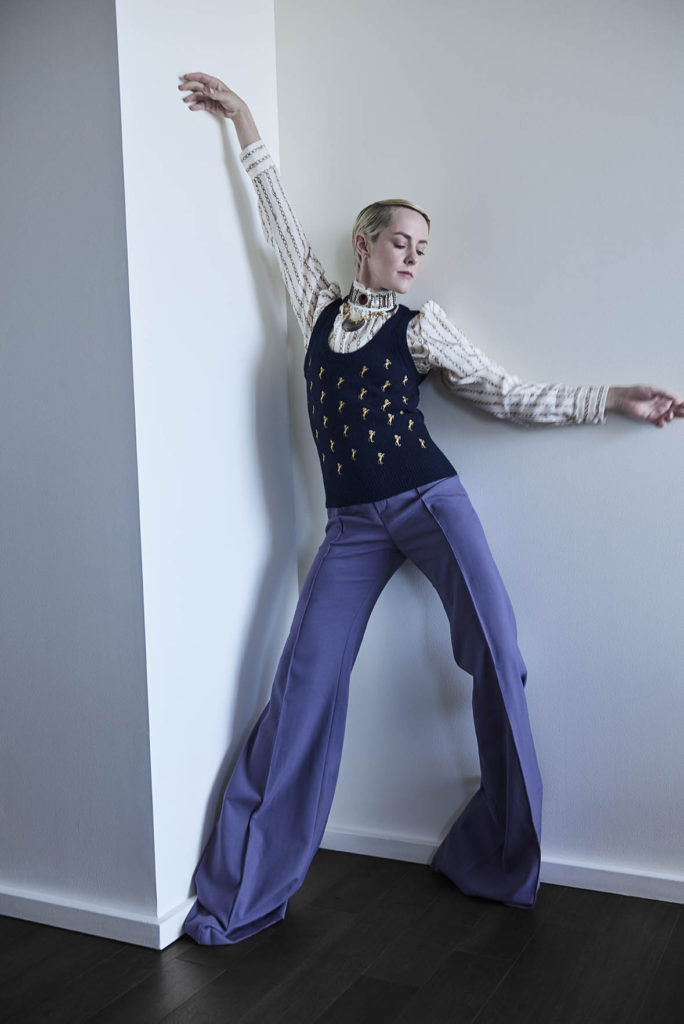
Blouse and pants by CHLOE
Your last return to Hollywood has been in the last few years following the birth of your son. What makes this stage of your career different from the other times you’ve taken a break and returned?
There’s more stories to tell in me. I miss it. I’ve missed having the space to be efficient in my artistry. There’s sort of this grand demise of efficiencies as a mom. Everything sort of takes longer. You only get so much done in your day, and there’s a lot of allowance, acceptance and amends, and I love all of that. I think as I’ve emerged into and through that space, a lot of new muscles and new understandings of the universe have also emerged. If I’m honest, I’m sort of excited about this new storyteller, excited about this new body that I get to inhabit, and excited about the new landscape of characters that I want to be defining. If anything, what’s most interesting about this most recent foray back into more career work is my hunger for it. My hunger feels like a child again, which is a really beautiful gift. Particularly, as a 34-year-old woman, I’ve been acting for almost 25 years. To feel like a child again but in a very self-advocating, self-love, deep [way]. Honoring my own skill set is really exciting.
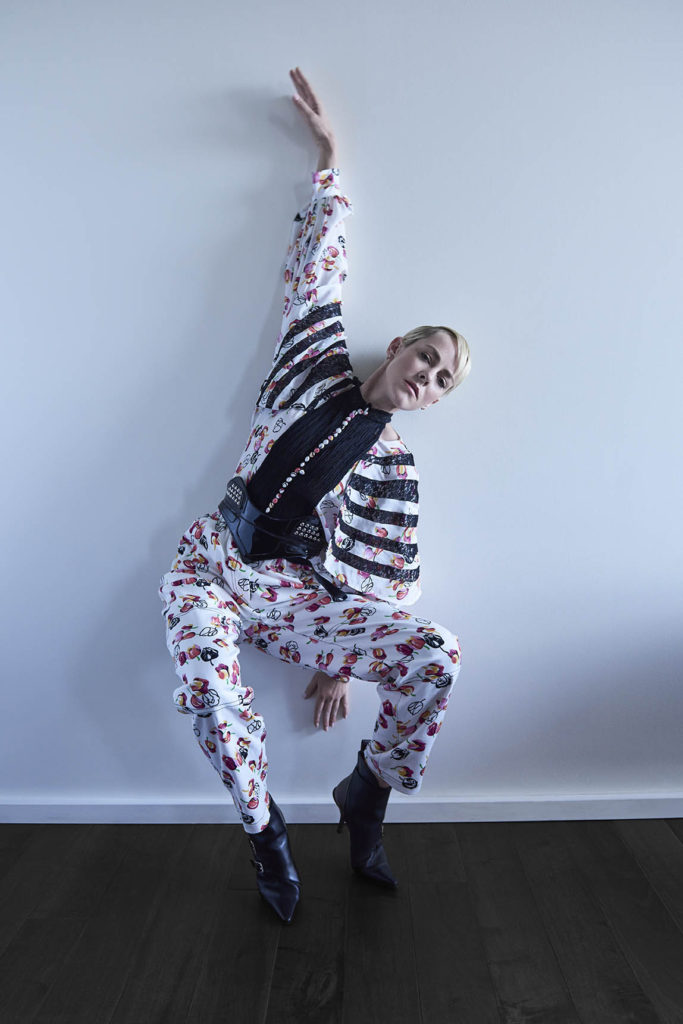
Blouse, pants, belt and boots by LOUIS VUITTON
Film doesn’t seem to be your only passion. You also have worked in music and photography. What has delving into these fields meant to you, and have they impacted your approach to acting?
I’ve never been quite content to do one thing ever. I think a lot of people are like that. I think most human beings are like that. We’re just not given the space to accept that part of ourselves. I think a lot of people’s side job is kind of their real love and their “work” becomes their work. I think I’ve entered into a space where, because my “work” was also part of my love, it allowed me to distance myself because it was enough to sustain me monetarily or I could keep looking elsewhere to see what other loves emerged, which I’m really glad I did. You start anything at ten, the whole world is your oyster. You don’t know what you’re going to be. You could be a great ballerina one day, an amazing climber the next. I’m glad that whatever was inside me decided to keep pushing into different formats.
The first real draw of that was wanting to be a cinematographer working on Stepmom when I was 13 and working with Vilmos Zsigmond, who was this amazing DP. He was the coolest person on set. He was the magician. He owned it, all of this machinery and mechanisms and lighting, all of his ideas and how well-versed he was in lighting scenarios and poetry. It was a very hypnotizing thing to watch, and after, I was like, Yep, I wanna be a DP. But in my own kind of rebellion because I also knew I was not the most well-educated person, I was like I want to study photography first and kind of understand a single frame. Then, as I get into studying the single frame, I’ll be able to understand going into more cinematography work. Then I got into photography which led into wanting to do more video editing work, so I was shooting and doing these video edits. That led to wanting to do soundscapes for those video pieces I was doing. Once I entered the world of trying to make my own soundscapes, I never returned. Music just took over this deep need to play in narration, and so the love of photography and music kind of stumbled into my biggest passions and I never got around to doing more DP work because I got so obsessed.
I do hope that I can allow different stumble steps as I grow older, more writing and directing and getting to collaborate with DPs. I think the more storytelling work you can do, whether it be molding clay, drawing pictures, taking photographs, writing poetry, making music, songwriting… All of these things are storytelling devices. The more well-versed you are in storytelling, regardless of the format, I think the better storyteller you can be. I value that little 16-year-old girl who made that decision to keep pushing herself because that’s planted such beautiful seeds that have grown into some of my most proud trees in my heart. It’s a beautiful thing, and it reminds me to keep that encouragement and that embodiment for my own child and for anyone that’s younger that may want to enter into storytelling. It’s a really important thing to remember that if you can’t instantly start acting to just keep veering, keep veering left, keep on the path of storytelling and you will eventually find your rhythm.
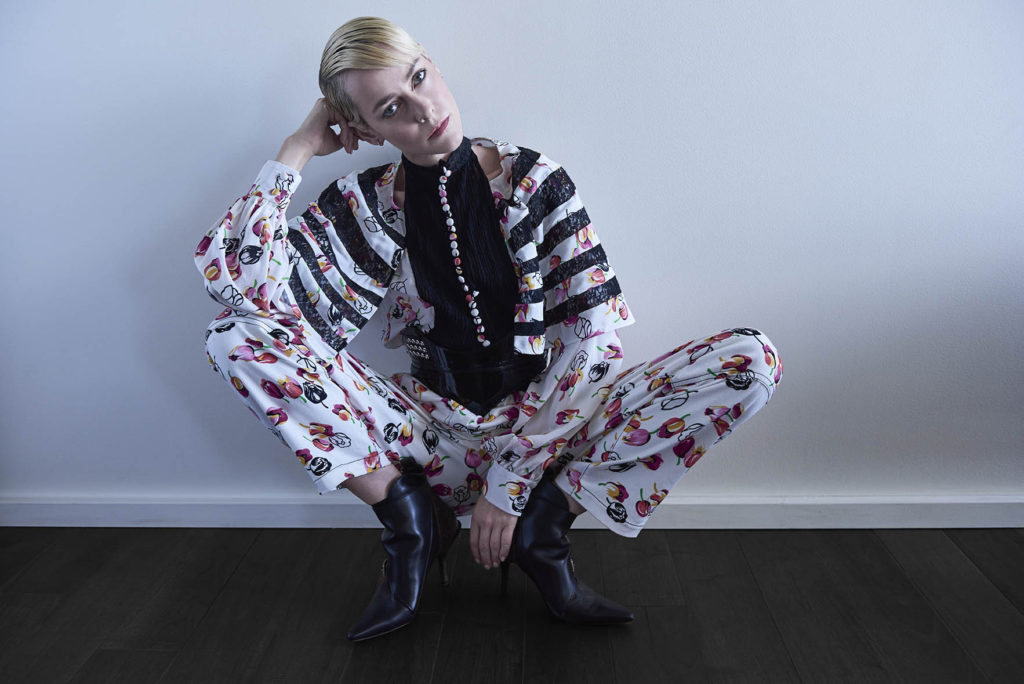
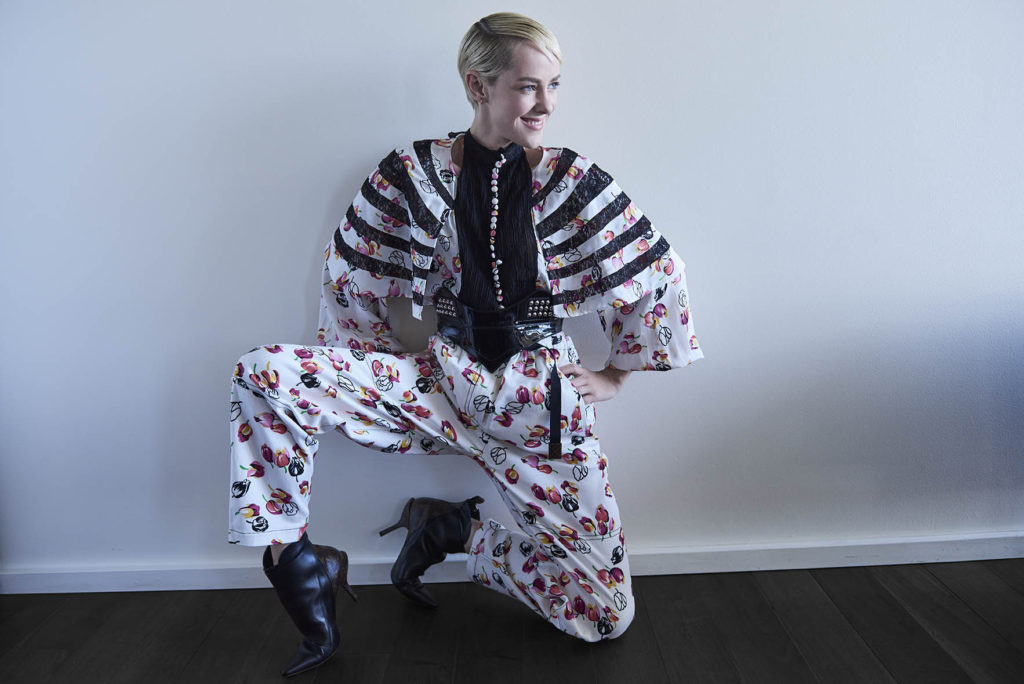
Blouse, pants, belt and boots by LOUIS VUITTON
One of your most widely-recognized roles was playing Johanna Mason in The Hunger Games franchise. For someone who stars mainly in indie projects, what drew you to the role? Would you ever star in a big franchise like this again?
I would work on a franchise in a second! It’s funny, just as an audience member reading scripts, there’s really no difference between independent and franchise work. It’s usually broader-scoped questions and less specificity of detail but for me, the only real difference is how much is my paycheck and what is craft service like. The difference between doing a small film like Lorelai, which I did this year, and doing The Hunger Games is really just craft service and how big my trailer was. When you’re doing something that you love, it doesn’t really matter how many lenses you have or how much per diem you’re getting. It’s a fortunate feast just to be there, so I definitely am not looking for a certain type of work. I never have. I always want to look for characters and stories I want to be a part of and I really loved The Hunger Games. I loved the stories, I loved the books, I loved the character. I loved Johanna Mason. I still do. I would totally do a whole Johanna Mason one woman show. If you love it, just do it. It doesn’t matter how big it is or how small it is. That’s the most important thing.
Your newest role is Diana in Nicolas Winding Refn’s limited series Too Old to Die Young. Can you tell me a bit about this character and what we can expect from your performance?
My character is this woman who is a child victims advocate, so she works with a lot of molestation and rape cases, working with people who are in the court system against child predators and helping them and making the law more understandable. But she also has a side job of energy work. I call her a white witch because I’ve known a few, and I think it’s an apt definition of someone that studies different occult sciences. Occult, not necessarily directly about death, but sciences that are not as well-known or well-studied. It’s the studies of rock energy, universal transformative energy, reiki, tarot, astrological patterns and understanding in the universe. I mean a trillion things. I took a whole course. I dove so deep. I’m shooting in New Orleans right now, and I went to see this high priestess of hoodoo because I was still interested in that work and seeing her read bones and energy and auras. It was a really cool thing. She’s [Diana] a very interesting character. She is one of the most interesting characters I have ever played in my life.
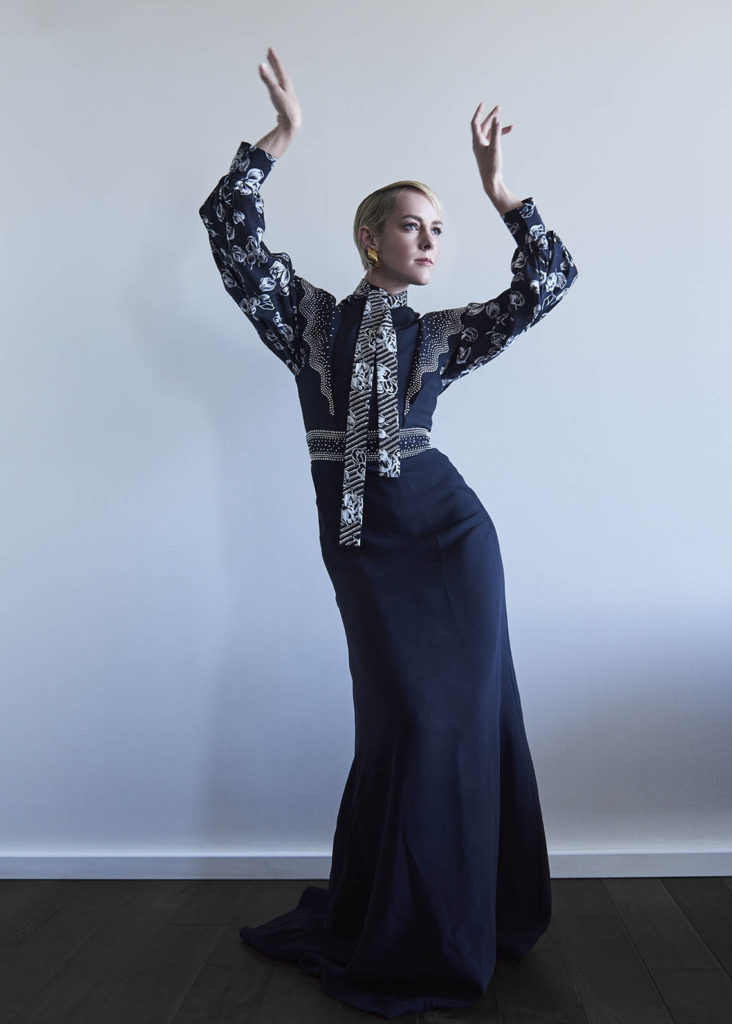
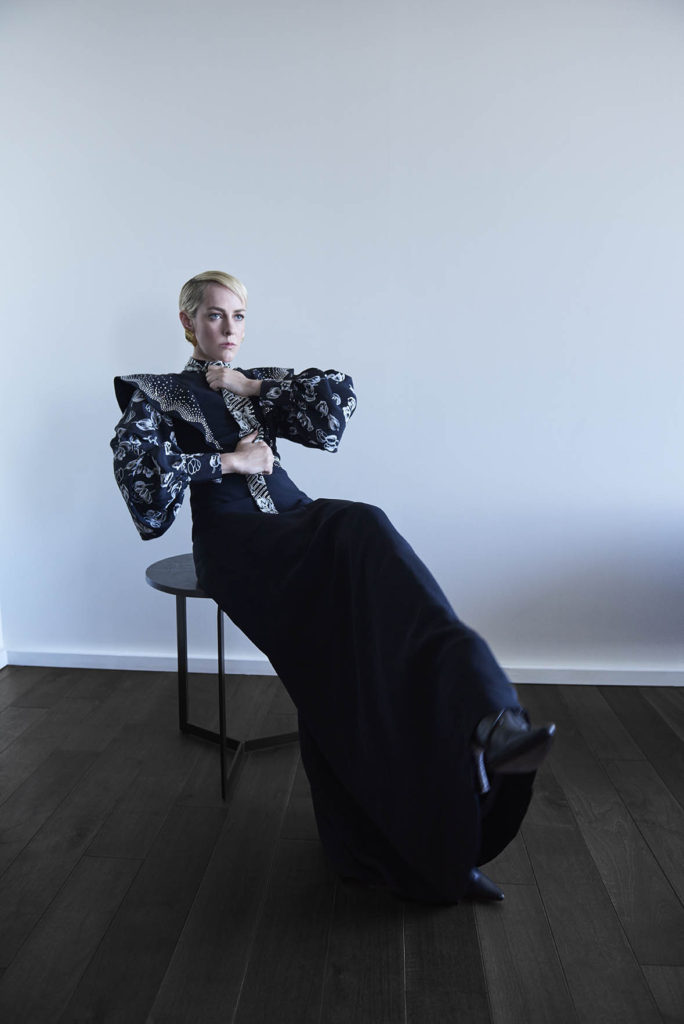
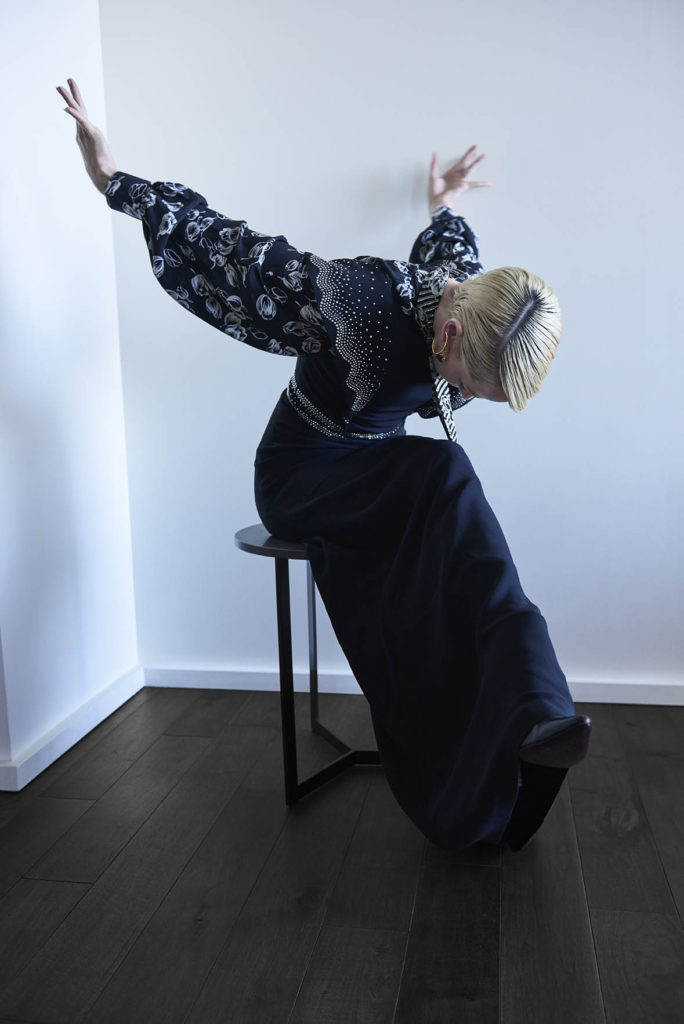
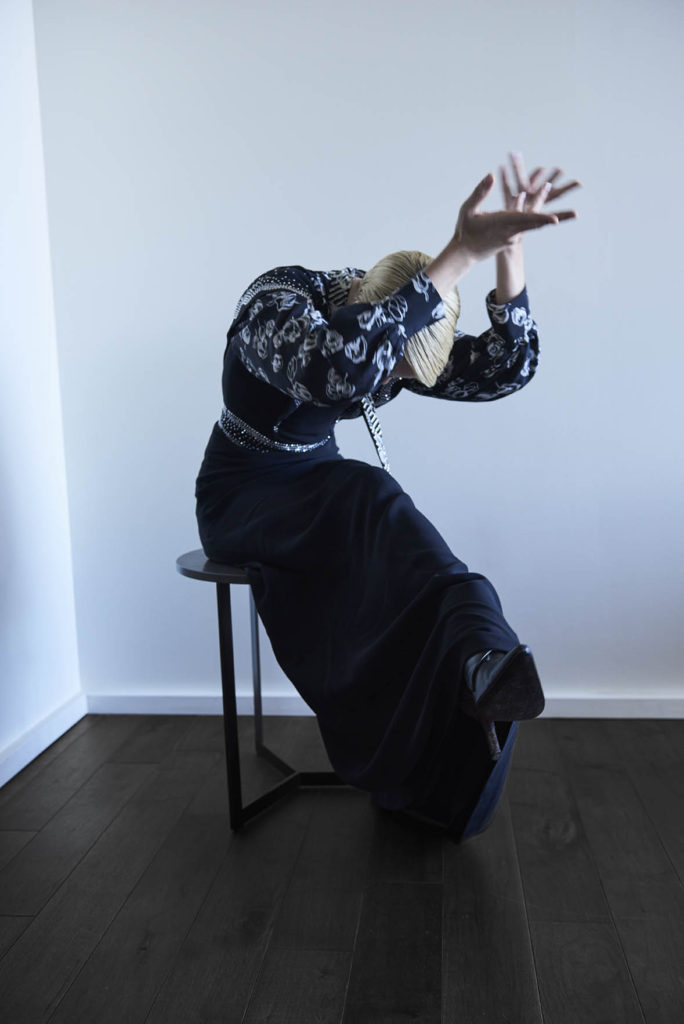
Dress, boots and earrings by LOUIS VUITTON
Nicolas Winding Refn is known for his apocalyptic noir style and stunning visuals. You starred in his 2016 film The Neon Demon. Tell me what initially drew you to his work and what’s it like to work with him for a second time on this project.
I was drawn to Nic Refn’s work because it’s just spell-binding, ground-breaking, wildly hypnotic, frustrating, enthralling. It opens up entire universes and then completely dismisses them and enters other things. He’s wildly courageous. He’s a very punk rock filmmaker and storyteller, and so I was really actually nervous auditioning for The Neon Demon because I really wanted it. Sometimes, I feel like when I really want something it kind of betrays me in the audition room and they smell my hunger and they’re not interested. Luckily, I guess, Nic was so happy that I was so hungry to dive in. I think that we got along so well on The Neon Demon. He’s attracted to certain types of actors that want to give everything that they can. It’s not about coming to set prepared. It’s coming to set with a thousand questions, and everything is a question. It’s always a yes and or yes, and what? or yes, and what if?, which I really appreciate. In a lot of collaborative relationships of building characters with directors and screenwriters, you really have to honor the parameters. What’s so interesting and enthralling and inspiring about working with Nic is that he sort of wants to decimate the parameters and that’s just amazing. My inner punk, poet rebellion is like, Yes, yes, yes, yes. I want to do that.
It was cool to get to work with him again because I already knew what he wanted, so it helped me bring new things to that palette. I also think he trusted me already after The Neon Demon and seeing what I could do and what we could do together. I feel like he gave me free reign to create and dive deep and assemble this character out of the recesses of my mind. He honored that and built a courage up in me, so I did feel like I was the character’s advocate, that I was the person that knew the character the best. He makes you feel like you are that character in a way that no one else could question, and that is definitely a gift.
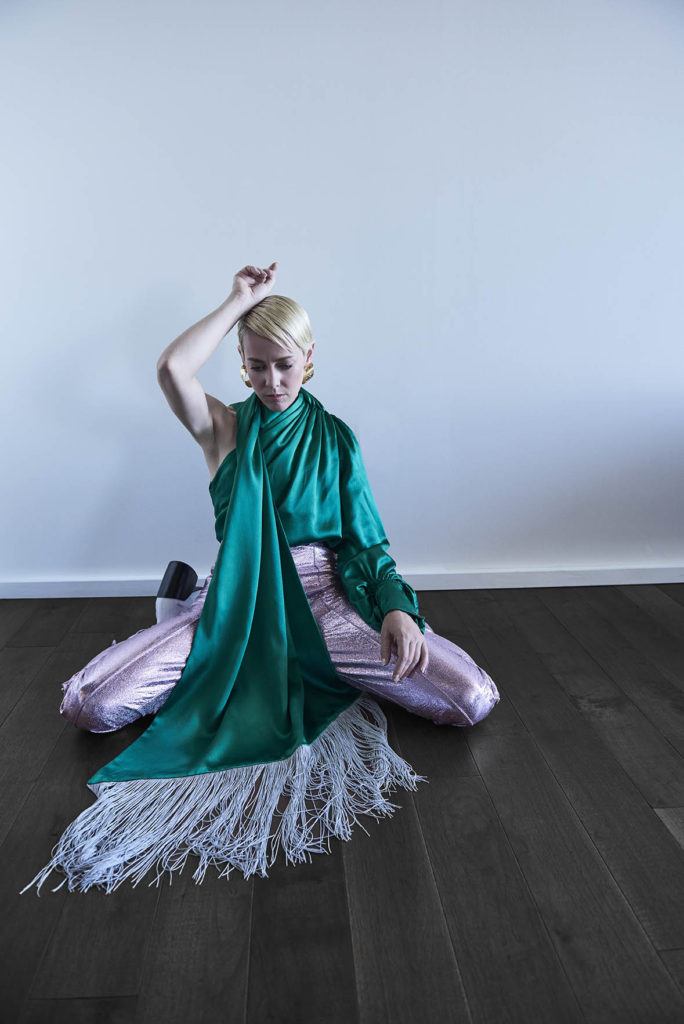
Blouse and pants by HILLIER BARTLEY, boots by CHLOE, bag by LOUIS VUITTON
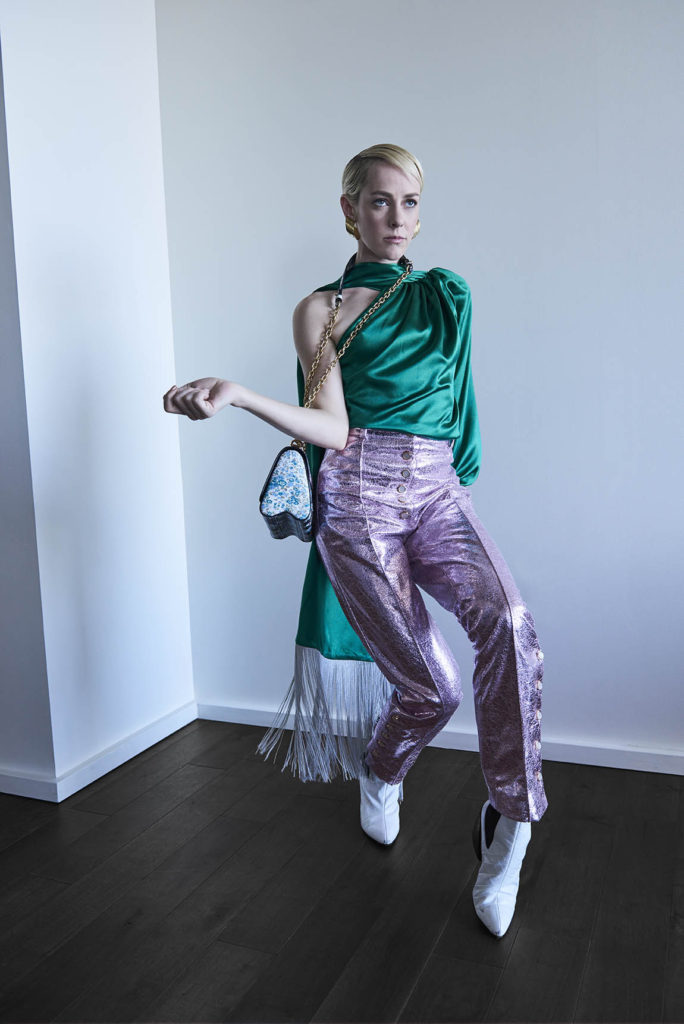
The series is extremely dark and grapples with some pretty heavy topics, something common to Nicolas Winding Refn’s work. What do you hope that audiences take away from the series?
It’s so funny. Literally the one question that always gets asked is, “What do you want the audience to take away from the experience.” It’s the one question I never want to ask because it’s the most insulting to an audience. I’m not going to put you in a dark room for an hour and a half to ingest a series just so you can think what I want you to think. I’m wanting to put you in this space so you can come to your own conclusions. Maybe certain things may startle you in a way that you’ve never known about yourself, or certain things may enliven you in a way you’ve never known about yourself and it brings you to a deeper understanding of who you are and how these stories reflect things in you and reflect things out of you. What’s cool about is Nic is that he allows this mysticism of storytelling where it’s not as linear as everyone thinks. It’s a very subversive way to tell very human truths. For me, I think it’s a really interesting story about toxic masculinity and the resurrection of what’s divine in the masculine and what should be heralded and what should be salvaged. Regardless of whether you’re a man or woman, I think these are questions that we should all be asking ourselves. He [Refn] proposes a lot of really interesting experiments in how to ask yourself these questions. Me, as an audience member, I think that’s what I would get from the journey of watching the series.
You’re set to star in a film about the life of David Bowie. Is there anything you can tell us about this new project?
Well, it’s going to be beautiful, but no, I can’t really say much.
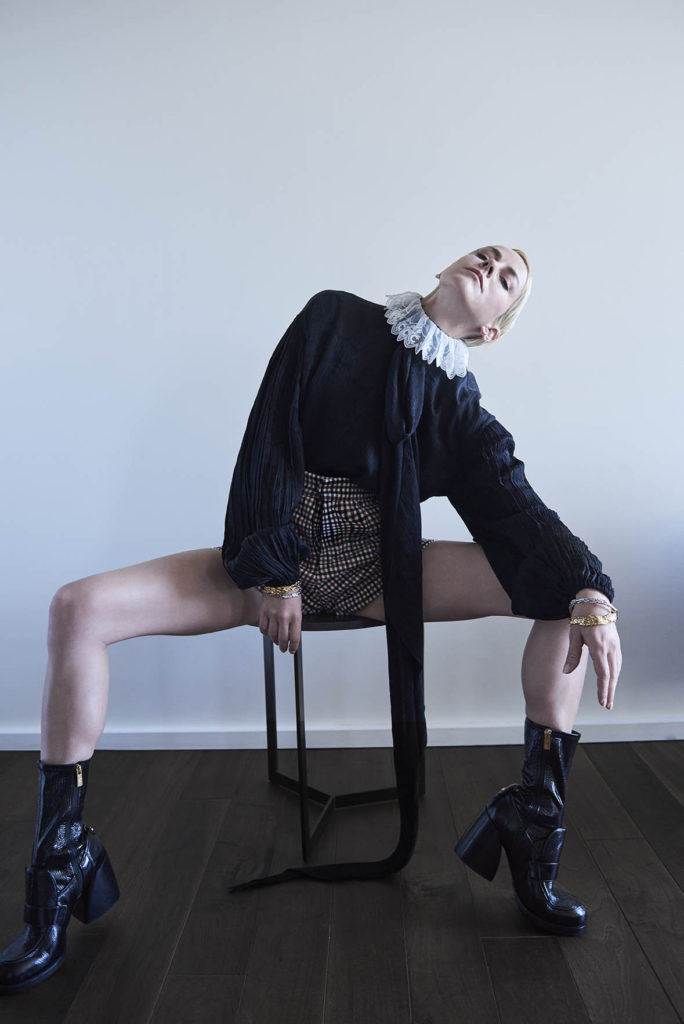
You’ve spent most of your life working in Hollywood. What draws you to roles and projects now? What are you looking forward to most in the next few years?
Well, if anything, I can say after 25 years I have no idea what draws me to a script. It’s either the truth or the embellishment of truth or the subversion of truth that invites you into a new truth. It’s always trying to get something that is real. I never know what I look for in a project or why I’m attracted to something. I can draw lines in the sand after and make conclusions, but if I’m perfectly honest about that moment of want or creation, it’s always a moment of surprise. The things I think I’ll be interested in, I read and maybe meet with the director and it’s not as aligned as I would’ve imagined.
What I’m looking forward to most as a woman, mother, and artist in this next chapter of my creation is just how to fully embody this space of living in the world with this dying, shifting paradigm of separatism and embracing this newer, holistic understanding of the universe and new narratives. As we’re looking out in the landscape of society, there’s all these buildings that are just crumbling. There’s things that are no longer serving us. All these windows are opening. These thresholds are glaring in their want to be described and walked through, and so as these sort of pockmarks are emerging in the new narrative landscape, it’s my job to be biting at the bit and drooling in hopes to fill them with something real and authentic and new. That’s my push, my hope and my impulse of wanting to get back into the game of storytelling again.
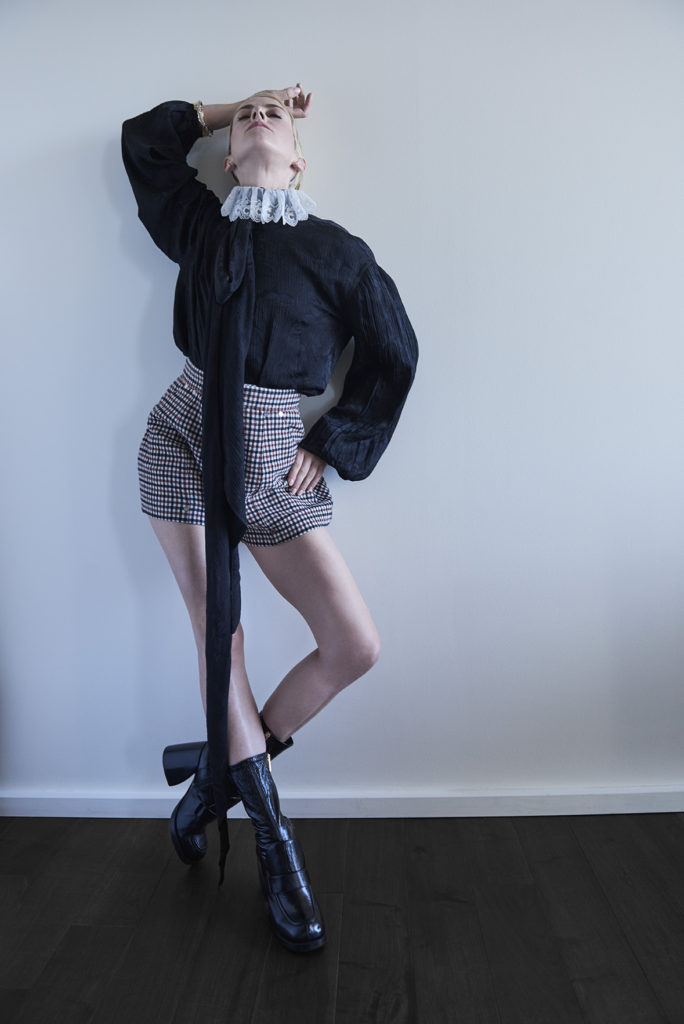
Blouse, shorts and boots by CHLOE
Quick Q’s
Next vacation spot?
My bed. I’ve got a lot of work to do and not a lot of time, so I just take those vacations of the mind.
You’re not filming. Where can we find you?
With my son.
Pet peeve?
I don’t really have a pet peeve. Sometimes, I really love strength and vulnerability and courage and sometimes I get mildly put off by peoples’, I don’t know, maybe weakness? Weakness is something that disarms me a little bit, but it’s the weakness through intentional lack of looking or intentional blindness.
What show are you currently bingeing?
I just finished the The Marvelous Mrs. Maisel and I’m obsessed.
Favorite lazy day activity?
Sleeping.
Dream co-star?
I just want to work with more children. I love it. I love every little bit of it.
Guilty pleasure?
Probably things on my phone. I’m not as courageously happy about my social engagement digitally sometimes. I’m like, did you just spend an hour thinking about what you’re going to write on Instagram? I have a hard time loving that without a mild taste of guilt or shame.
What song do you have on repeat?
I really love Thao & The Get Down Stay Down. Their album, We The Common, is just one of my favorite, constant, on-repeat, hungry for, constantly inspired by.
*Author’s Note: This interview was transcribed and edited for length and/or clarity.
Credits
Photographer: Frederic Auerbach
Creative Director: Deborah Ferguson
Makeup: Bethany McCarty at Nest Artists
Hair: Sunnie Brook at Forward Artists
Digital Tech: Haris, Pop Digital
Interview and Web Layout: Sydney Nash
Location courtesy of AKA West Hollywood

